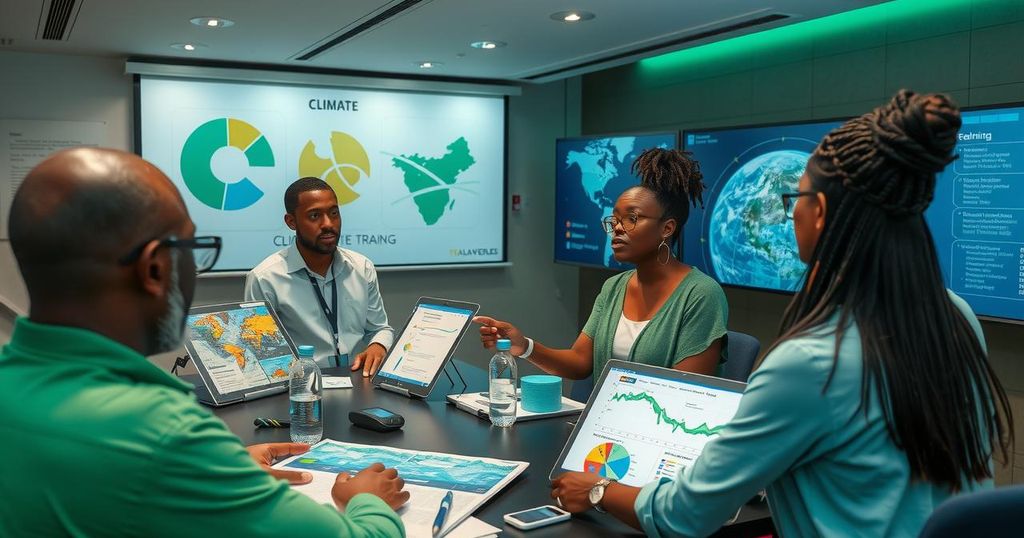The UN has warned that the world is on track for a 3.1C increase in global temperatures this century unless significant reductions in emissions are made. The goal of limiting warming to 1.5C looks increasingly unattainable, as current measures fail to close the emissions gap. Nations are urged to enhance their climate commitments ahead of the upcoming Cop29 talks, emphasizing the urgent need for a global mobilization to combat climate change effectively.
The United Nations has issued a stark warning regarding global warming, indicating that the world is on course for a “catastrophic” increase of 3.1 degrees Celsius this century, unless substantial efforts are made to cut emissions responsible for climate change. According to the UN Environment Programme (UNEP), the international goal of limiting global temperature rise to 1.5 degrees Celsius will soon be unachievable without significant global mobilization and rapid action to reduce greenhouse gas emissions. The latest report highlights a serious gap between the necessary reductions in emissions and the commitments made by various nations. Currently, projections indicate that without enhanced commitments, temperature increases could range from 2.6 to 3.1 degrees Celsius, depending on the implementation of existing climate action pledges. As countries prepare for the upcoming UN Cop29 talks in Baku, Azerbaijan, where discussions will focus on increasing financial support for developing nations in their climate efforts, the urgency for bolder actions cannot be overstated. Since the Paris Agreement was established in 2015, which sought to limit global temperature rise to well below 2 degrees Celsius, nations have committed to specific action plans known as nationally determined contributions (NDCs). These plans are designed to cut emissions by 2030 through a transition away from fossil fuels and the restoration of natural habitats. However, current trends indicate that global greenhouse gas emissions are still rising, having increased by 1.3% in 2023 compared to 2022. This trend is largely driven by the G20 countries, which are responsible for more than three-quarters of global emissions. The UNEP report underscores that even if current climate commitments are fully realized, they would only result in a temperature rise of 2.6 to 2.8 degrees Celsius by 2100. Alarmingly, countries are presently not on track to meet these targets. UN Secretary-General António Guterres warned, “Either leaders bridge the emissions gap, or we plunge headlong into climate disaster – with the poorest and most vulnerable suffering the most.” Guterres further emphasized that immediate action is necessary, including a complete phase-out of fossil fuels, an expansion of renewable energy, and a commitment to halt deforestation. Inger Andersen, Executive Director of UNEP, called for unprecedented global mobilization, stating, “Climate crunch time is here. We need global mobilisation on a scale and pace never seen before – starting right now, before the next round of climate pledges – or the 1.5C goal will soon be dead.” Andersen also stated that even if the world surpasses the 1.5-degree threshold, it is critical to strive for a sustainable global future, as every fraction of a degree avoided can save lives, protect economies, and conserve biodiversity. Nations are urged to commit to a 42% reduction in annual greenhouse gas emissions by 2030 and 57% by 2035 in the upcoming NDC submissions. Achieving these targets is technologically feasible by tripling renewable energy capacity, enhancing energy efficiency, and protecting natural environments. The need for a comprehensive global effort to curb greenhouse gas emissions is immediate, with the G20 expected to lead these crucial initiatives.
The warnings about imminent global warming crises emphasize the increasing urgency of addressing climate change. The international community recognizes the target set during the Paris Agreement to limit warming to 1.5 degrees Celsius above pre-industrial levels as critical to preventing catastrophic climate impacts. Current emissions data reflect a troubling trend, with rising greenhouse gases contributing to the acceleration of climate changes that pose risks to ecosystems and human societies alike. As nations prepare to revise their climate pledges, the UN stresses that without an urgent and unified global response, the objectives for climate stabilization may become unattainable.
In conclusion, the United Nations has alerted the world to the increasing risks associated with climate change, signifying that without significant reductions in greenhouse gas emissions, we could witness a devastating rise in global temperatures of up to 3.1 degrees Celsius this century. There is a critical need for nations to intensify their climate commitments as they approach the upcoming UN Cop29 meeting. The pursuit of the 1.5-degree target necessitates immediate and comprehensive action aimed at reducing emissions, transitioning to renewable energy sources, and supporting vulnerable countries in their climate adaptation efforts. The time for decisive action is now, as every fraction of a degree matters.
Original Source: www.independent.co.uk




